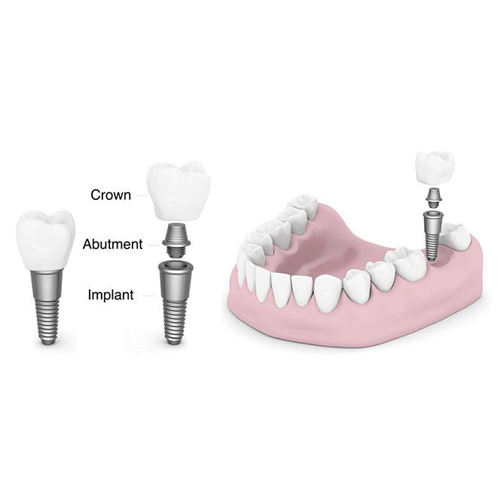A. It is beneficial to have missing teeth replaced. The treatment options include:
A. Dental implants are a durable treatment that provide great aesthetics and excellent functionality, but are the most expensive option. Dental implants also aid in reducing bone loss and gum recession. Dental bridges are more affordable and should last for several years if properly maintained.
However, they do need replacing eventually and the adjacent teeth will have to be prepared in advance. The bone and gums will also continue to shrink with a bridge, which may mean that the bridge gap can become visible.
Dentures are inexpensive and the viable option for replacing a large amount of teeth, however can be uncomfortable and cause irritation and soreness. They also have to be removed daily for cleaning.

They are small screw-shaped devices that are used to replace the root portion of a missing tooth. Implants are placed into the jaw bone and then left to heal and integrate into the bone (also known as osseointegration). Once they have healed fully, a new crown, dental bridge, or denture can be attached. Implants are made from titanium so there is no risk of irritation.
Yes, dental implants are safe. Studies spanning 20 years have suggested no problems or dangers.
Implants should last for at least 15 years. Research is limited in this area as the treatment is relatively new, but most experts state that dental implants are viewed among them as the most beneficial ways of replacing lost teeth.
Yes, implants can be used to replace many missing teeth.
No, implants may not be suitable for some, including smokers and people who have very weak bone tissue. A bone graft may be needed where there is insufficient bone supply.
The procedure can be carried out either using local anaesthetic or sedation, so there should be minimal discomfort experienced. However, you may experience a mild pain following the procedure. Taking painkillers will help to ease any discomfort, which should subside within a few days. Your dentist will advise you how and when to take pain relief medication.
It will take a period of time for the implant to integrate with the bone tissue. In the case of lower implants, this usually takes 3-4 months, while upper implants take around 6 months to heal. Your dentist can fit a temporary restoration during the healing process.
It usually takes around 5 months from the first consultation to the end of treatment for lower jaw implants and up to 9 months for upper jaw implants.
You should take care of your implant in the same manner as your natural teeth. If you have any questions or concerns, your dentist will be able to advise you on how to maintain the cleanliness of your implant.

No, gum disease affects the connective tissue between the gums and the teeth, and this tissue is not present in implanted teeth. Infection is possible but only in very rare circumstances.
In most cases, implanted teeth are only removed by a dentist. However, those with dentures can remove them for cleaning.
If you have a single missing tooth, you will need a single implant. However, implants can support more than one tooth and if you are having a full arch replaced, you will probably only need around 6 implants. Your dentist will be able to give you exact details of how many implants you will need.
Your dentist will ensure that the implants are not visible when you talk or smile, but the implants will be made visible in order for you to clean them.
Recognised as implant failure, this is nonetheless uncommon. If for some reason the implant does not integrate, it can be taken out and replaced once the gum tissue has healed fully.
Smoking can increase the risk of implant failure, and this is why smokers are advised to quit before receiving implant treatment.
There is no recorded case of an allergy to dental implants.
Implants are suitable for most people. Your dentist will be able to tell you if you are a suitable candidate for treatment once they have examined your mouth and performed X-rays to check bone density.

Talk to your dentist about dental implants. He/she will be able to explain what the treatment entails and how it works. In complex cases, patients can be referred to a specialist.




Fields with (*) are required.
Please contact us via this website or email without disclosing confidential information.
277 High Street, Dorking, Surrey RH4 1RY
Call us today: 01306 885611
| Monday | 8.00 am - 17.30 pm |
| Tuesday | 8.00 am - 17.30 pm |
| Wednesday | 8.00 am - 19.00 pm |
| Thursday | 8.00 am - 16.00 pm |
| Friday | 8.00 am - 16.00 pm |
| Alternate Saturday | 9.00 am - 13.00 pm |
| Sunday | Closed |